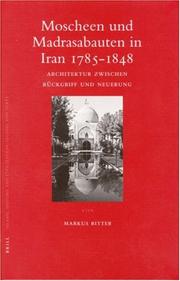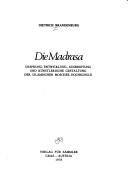| Listing 1 - 10 of 14 | << page >> |
Sort by
|
Book
ISBN: 1443856851 9781443856850 1443897930 9781443897938 Year: 2016 Publisher: Newcastle upon Tyne
Abstract | Keywords | Export | Availability | Bookmark
 Loading...
Loading...Choose an application
- Reference Manager
- EndNote
- RefWorks (Direct export to RefWorks)
Madrasahs --- Madrasas --- Madrasehs --- Madrassahs --- Madrassas --- Medreses --- Medressehs --- Islamic religious education --- Schools --- Muslims --- Education
Book
ISBN: 9353289319 9353289300 9353289297 9789353289300 9789353289294 Year: 2020 Publisher: Los Angeles
Abstract | Keywords | Export | Availability | Bookmark
 Loading...
Loading...Choose an application
- Reference Manager
- EndNote
- RefWorks (Direct export to RefWorks)
Madrasahs --- Madrasas --- Madrasehs --- Madrassahs --- Madrassas --- Medreses --- Medressehs --- Islamic religious education --- Schools --- Muslims --- Education
Book
ISBN: 1281801712 9786611801717 0813545625 9780813545622 9781281801715 9780813543451 0813543452 Year: 2008 Publisher: New Brunswick, NJ
Abstract | Keywords | Export | Availability | Bookmark
 Loading...
Loading...Choose an application
- Reference Manager
- EndNote
- RefWorks (Direct export to RefWorks)
In the wake of the terrorist attacks on September 11, 2011, discussions on ties between Islamic religious education institutions, namely madrassahs, and transnational terrorist groups have featured prominently in the Western media. In the frenzied coverage of events, however, vital questions have been overlooked: What do we know about the madrassahs? Should Western policymakers be alarmed by the recent increase in the number of these institutions in Muslim countries? Is there any connection between them and the "global jihad"? Ali Riaz responds to these questions through an in-depth examination of the madraassahs in Pakistan, Bangladesh, and India. In Faithful Education, he examines these institutions and their roles in relation to current international politics.
Islamic religious education --- Madrasahs --- Muslim religious education --- Religious education, Islamic --- Islamic education --- Religious education --- Madrasas --- Madrasehs --- Madrassahs --- Madrassas --- Medreses --- Medressehs --- Schools --- Muslims --- Education
Book
ISBN: 1474401767 1474401759 9781474401760 1474401740 9781474401746 1474401732 9781474401739 1469620138 9781469620138 9781474401753 9781474401753 1469620146 1469623331 9798890885869 Year: 2022 Publisher: Edinburgh
Abstract | Keywords | Export | Availability | Bookmark
 Loading...
Loading...Choose an application
- Reference Manager
- EndNote
- RefWorks (Direct export to RefWorks)
Explains the role of the madrasa in the cultural, intellectual and religious experience of MuslimsThe prospects for peace in Afghanistan, dialogue between Washington and Tehran, the UN’s bid to stabilise nuclear-armed Pakistan, understanding the largest Muslim minority in the world’s largest democracy in India, or the largest Muslim population in the world in Indonesia – all require some knowledge of the traditional religious sectors in these countries and of what connection traditional religious schooling has (or not) to their geopolitical situations.Moosa delves into the world of madrasa classrooms, scholars and texts, recounting the daily life and discipline of the inhabitants. He shows that madrasa are a living, changing entity, and the site of contestation between groups with varying agendas, goals and notions of modernity.Reading this unique and engaging introduction will provide readers with a clear grasp of the history, place and function of the madrasa in today’s Muslim world (religious, cultural and political). It will also investigate the ambiguity underlying the charge that the madrasa is at heart a geopolitical institution.Key Features:Structured clearly around the role and function of the madrasa in the past and the presentInfuses history, tradition and everyday practice with concrete examples of how the institutions functionProvides a view of the madrasa from within – the author studied in leading Indian madrasas for 6 yearsTreats madrasas worldwide, with a special focus on those in South AsiaIncludes a glossary of key non-English terms used in the book
Madrasahs. --- Islamic education. --- Islamic religious education. --- Muslim religious education --- Religious education, Islamic --- Islamic education --- Religious education --- Education, Islamic --- Education, Muslim --- Islam --- Muslim education --- Education --- Madrasas --- Madrasehs --- Madrassahs --- Madrassas --- Medreses --- Medressehs --- Islamic religious education --- Schools --- Muslims

ISBN: 9004144811 9047417925 Year: 2006 Volume: 62 Publisher: Leiden Brill
Abstract | Keywords | Export | Availability | Bookmark
 Loading...
Loading...Choose an application
- Reference Manager
- EndNote
- RefWorks (Direct export to RefWorks)
Architecture --- Islamic architecture --- Madrasahs --- Mosques --- Architecture, Asian --- Religious institutions --- Madrasas --- Madrassahs --- Madrassas --- Medreses --- Schools --- Muslims --- Architecture, Western (Western countries) --- Building design --- Buildings --- Construction --- Western architecture (Western countries) --- Art --- Building --- History --- Education --- Design and construction --- Iran --- Architecture [Islamic ] --- 18th century --- 19th century --- Madrasehs --- Medressehs --- Islamic religious education --- Architecture, Primitive

ISBN: 3853650376 9783853650370 Year: 1978 Publisher: Graz Verl. für Sammler
Abstract | Keywords | Export | Availability | Bookmark
 Loading...
Loading...Choose an application
- Reference Manager
- EndNote
- RefWorks (Direct export to RefWorks)
Madrasahs --- Islamic education --- College buildings --- -Islamic education --- Madrasas --- Medreses --- Schools --- Muslims --- Education, Islamic --- Education, Muslim --- Islam --- Muslim education --- Education --- Universities and colleges --- University buildings --- College facilities --- School buildings --- Buildings --- Islamic education. --- Madrasahs. --- Madrassahs --- Madrassas --- Madrasehs --- Medressehs --- Islamic religious education --- College buildings - Islamic countries
Book
ISBN: 9053567100 9786612067853 1282067850 9048501385 9789048501380 9781282067851 9789053567104 6612067853 Year: 2008 Publisher: Amsterdam : Amsterdam University Press,
Abstract | Keywords | Export | Availability | Bookmark
 Loading...
Loading...Choose an application
- Reference Manager
- EndNote
- RefWorks (Direct export to RefWorks)
The Madrasa in Asia presents a nuanced overview of the unknown world behind the walls of these traditional Islamic schools in Asia.
Islamic education -- Political aspects -- Asia -- Congresses. --- Islamic education -- Political aspects -- Asia. --- Madrasahs -- Asia -- Congresses. --- Madrasahs -- Asia. --- Madrasahs --- Islamic education --- Education, Special Topics --- Education --- Social Sciences --- Political aspects --- Education, Islamic --- Education, Muslim --- Islam --- Muslim education --- Madrasas --- Medreses --- Madrassahs --- Madrassas --- Schools --- Muslims --- Madrasehs --- Medressehs --- Islamic religious education --- culture and instituten --- culture and institutions --- sociology --- sociologie
Book
ISSN: 09292403 ISBN: 9789004355293 9004355294 900435655X 9789004356559 Year: 2018 Volume: 151 Publisher: Leiden Brill
Abstract | Keywords | Export | Availability | Bookmark
 Loading...
Loading...Choose an application
- Reference Manager
- EndNote
- RefWorks (Direct export to RefWorks)
In Formation of a Religious Landscape: Shi'i Higher Learning in Safavid Iran, Maryam Moazzen offers the first systematic examination of Shi'i educational institution and practices by exploring the ways in which religious knowledge was produced, authenticated, and transmitted in the second half of Safavid rule (1588-1722). By analyzing the deeds of endowment of the Madrasa-yi Sulṭānī and other mosque-madrasas built by the Safavid elite, this study sheds light on the organizing mechanisms and structures utilized by such educational foundations. Based on the large number of ijazās and other primary sources including waqfiyyas, biographical dictionaries and autobiographies, this study also reconstructs the Safavid madrasas' curriculum and describes the pedagogical methods used to transmit religious knowledge as well as issues that faced Shi'i higher learning in early modern times.
Madrasahs --- Islamic religious education --- Shiites --- Islamic education --- Education, Islamic --- Education, Muslim --- Islam --- Muslim education --- Shia Muslims --- Shiah Muslims --- Shiahs --- Shias --- Shiite Muslims --- Muslim religious education --- Religious education, Islamic --- Madrasas --- Medreses --- History --- Education&delete& --- Education --- Muslims --- Religious education --- Madrassahs --- Madrassas --- Schools --- History. --- Madrasehs --- Medressehs --- Madrasahs - Iran - History --- Islamic religious education - Iran - History --- Shiites - Education - Iran - History --- Islamic education - Iran - History
Book
ISBN: 1787547183 1787545318 1787545326 1787542661 9781787547186 9781787545311 9781787545328 Year: 2019 Publisher: Bingley, UK
Abstract | Keywords | Export | Availability | Bookmark
 Loading...
Loading...Choose an application
- Reference Manager
- EndNote
- RefWorks (Direct export to RefWorks)
In Islamic education, the development of teaching and learning for the physical and spiritual training of humanity places equal importance on revealed and acquired knowledge. This book provides a greater understanding of Islamic pedagogy from a spiritual perspective, which requires empathy with the Islamic premise of the inseparable nature of knowledge and the sacred. The book is intended to provide a particular insight into the relationship between Islamic pedagogy and embodied learning and associated common features that are seen in Madrasahs, and related educational institutions. The first part of the book traces key moments in madrasah history and their formation; diversity of Islamic institutions, and the notion of the scholastic community. It identifies the rise of the Islamic education institutions and the diversity within their formation. Despite the partial disappearance of the spiritual in many Islamic education institutions, the authors argue that the spiritual construct is still deeply implicated in the reification of Islamic pedagogy and in the process of embodiment. The second part of the book draws on unravelling knowledge and the sacred that considers the philosophy of Islam and knowledge, spiritual understanding of Islamic education, and knowledge and the sacred as an educational compass. Finally, the book explores the implications of Islamic pedagogy and embodied learning, the universal nature of Islamic pedagogy, and reflections for the future. By bringing to bear a variety of Islamic and educational studies research, relative to Islamic pedagogy, this book opens up new avenues for research into Islamic education. The book will be of particular interest to scholars investigating Islamic education, Islamic pedagogy, and embodied learning.
Islamic education. --- Education --- Children --- Education, Primitive --- Education of children --- Human resource development --- Instruction --- Pedagogy --- Schooling --- Students --- Youth --- Civilization --- Learning and scholarship --- Mental discipline --- Schools --- Teaching --- Training --- Education, Islamic --- Education, Muslim --- Islam --- Muslim education --- Religious aspects --- Islam. --- Madrasahs. --- Multicultural education. --- Multicultural Education. --- Madrasas --- Madrasehs --- Madrassahs --- Madrassas --- Medreses --- Medressehs --- Islamic religious education --- Muslims
Periodical
ISSN: 26208997 26209004
Abstract | Keywords | Export | Availability | Bookmark
 Loading...
Loading...Choose an application
- Reference Manager
- EndNote
- RefWorks (Direct export to RefWorks)
Islamic education --- madrasas --- Education, Elementary --- Madrasahs --- Education, Elementary. --- Madrasahs. --- Indonesia. --- Madrasas --- Madrasehs --- Madrassahs --- Madrassas --- Medreses --- Medressehs --- Schools --- Muslims --- Children --- Elementary education --- Primary education (Great Britain) --- Education --- School children --- Education (Elementary) --- Dutch East Indies --- Endonèsie --- Indanezii͡ --- Indoneshia --- Indoneshia Kyōwakoku --- Indonesi --- Indonesya --- Indonezia --- Indonezii͡ --- Indonezija --- İndoneziya --- İndoneziya Respublikası --- Indūnīsīy --- Induonezėj --- Jumhūrīyah Indūnīsīy --- PDRI --- Pemerintah Darurat Republik Indonesia --- R.I. --- Republic of Indonesia --- Republic of the United States of Indonesia --- Republica d'Indonesia --- Republiek van Indonesi --- Republik Indonesia --- Republik Indonesia Serikat --- Republika Indonezii͡ --- Republika Indonezija --- Rėspublika Indanezii͡ --- RI --- United States of Indonesia --- Yinni --- Islamic religious education --- islamic education --- Indonesia --- Dutch East Indies (Territory under Japanese occupation, 1942-1945) --- Indanezii︠a︡ --- Indonesië --- Indonezii︠a︡ --- Indūnīsīyā --- Induonezėjė --- Jumhūrīyah Indūnīsīyā --- Republiek van Indonesië --- Republika Indonezii︠a︡ --- Rėspublika Indanezii︠a︡
| Listing 1 - 10 of 14 | << page >> |
Sort by
|

 Search
Search Feedback
Feedback About UniCat
About UniCat  Help
Help News
News